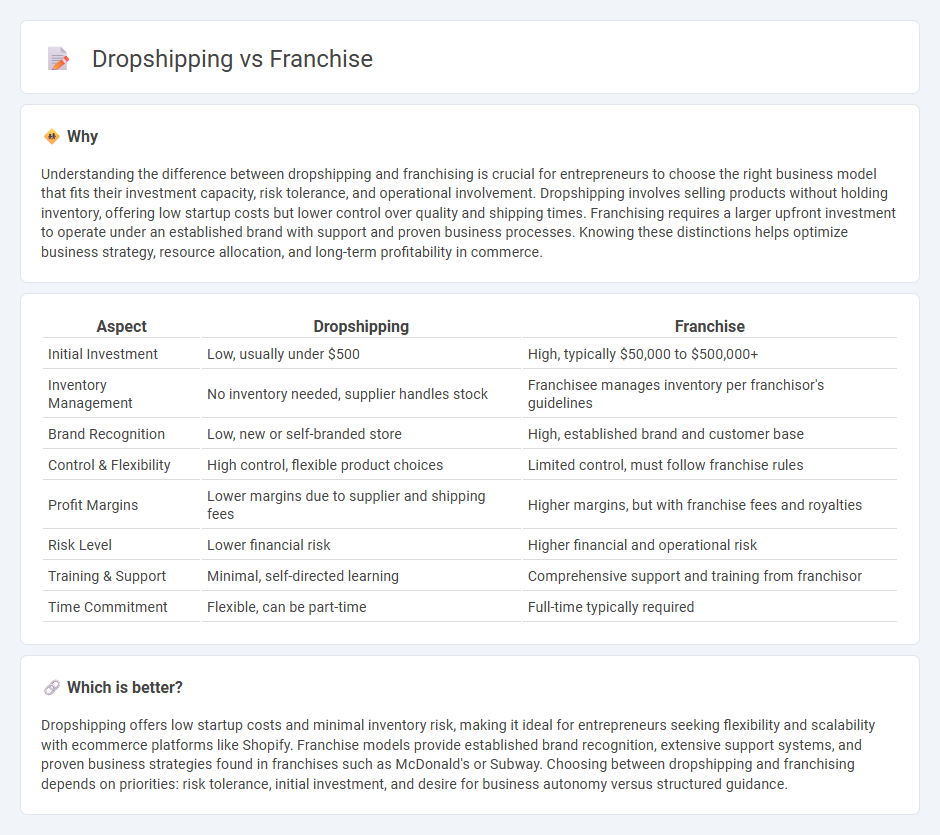
Dropshipping enables entrepreneurs to sell products directly from suppliers without holding inventory, reducing upfront investment and operational costs. Franchising offers a proven business model with established brand recognition, providing structured support but requiring significant initial fees and ongoing royalties. Explore the advantages and challenges of dropshipping versus franchising to determine the best fit for your commercial ambitions.
Why it is important
Understanding the difference between dropshipping and franchising is crucial for entrepreneurs to choose the right business model that fits their investment capacity, risk tolerance, and operational involvement. Dropshipping involves selling products without holding inventory, offering low startup costs but lower control over quality and shipping times. Franchising requires a larger upfront investment to operate under an established brand with support and proven business processes. Knowing these distinctions helps optimize business strategy, resource allocation, and long-term profitability in commerce.
Comparison Table
| Aspect | Dropshipping | Franchise |
|---|---|---|
| Initial Investment | Low, usually under $500 | High, typically $50,000 to $500,000+ |
| Inventory Management | No inventory needed, supplier handles stock | Franchisee manages inventory per franchisor's guidelines |
| Brand Recognition | Low, new or self-branded store | High, established brand and customer base |
| Control & Flexibility | High control, flexible product choices | Limited control, must follow franchise rules |
| Profit Margins | Lower margins due to supplier and shipping fees | Higher margins, but with franchise fees and royalties |
| Risk Level | Lower financial risk | Higher financial and operational risk |
| Training & Support | Minimal, self-directed learning | Comprehensive support and training from franchisor |
| Time Commitment | Flexible, can be part-time | Full-time typically required |
Which is better?
Dropshipping offers low startup costs and minimal inventory risk, making it ideal for entrepreneurs seeking flexibility and scalability with ecommerce platforms like Shopify. Franchise models provide established brand recognition, extensive support systems, and proven business strategies found in franchises such as McDonald's or Subway. Choosing between dropshipping and franchising depends on priorities: risk tolerance, initial investment, and desire for business autonomy versus structured guidance.
Connection
Dropshipping and franchises both offer scalable business models that minimize upfront inventory costs, allowing entrepreneurs to enter retail markets with lower financial risk. Dropshipping relies on third-party suppliers to fulfill orders directly to customers, while franchises provide a proven brand and operational support in exchange for fees and royalties. Integrating dropshipping within a franchise framework can enhance product variety and reduce logistical complexities, optimizing overall commerce efficiency.
Key Terms
Ownership Model
Franchise ownership involves acquiring rights to operate an established brand with a proven business model, providing franchisors with ongoing support and marketing resources. Dropshipping ownership relies on managing an online storefront without holding inventory, where suppliers handle product fulfillment directly to customers, minimizing upfront investment and inventory risk. Explore the nuances of franchise and dropshipping ownership models to determine the best fit for your entrepreneurial goals.
Supply Chain Control
Franchise businesses maintain stringent supply chain control by managing inventory, logistics, and supplier relationships to ensure consistent product quality and customer experience. Dropshipping relies on third-party suppliers to handle inventory and shipping, resulting in limited oversight over supply chain processes and potential variability in order fulfillment. Explore detailed comparisons to understand how supply chain control impacts operational efficiency and brand reputation in each model.
Branding Rights
Franchise business models provide exclusive branding rights, allowing franchisees to use established trademarks and marketing strategies for consistent brand recognition. Dropshipping lacks these rights, as sellers typically operate under different brand identities without direct control over product branding. Discover the key distinctions between franchise branding rights and dropshipping to choose the best fit for your business goals.
Source and External Links
Franchising - Wikipedia - Franchising is a business expansion strategy where a franchisor licenses its business model, brand, and rights to a franchisee who pays fees and operates under the franchisor's system, often used to minimize capital investment and risk.
What is a Franchise - International Franchise Association - A franchise is a business method where a franchisor licenses a franchisee to operate under its trademark and business format, including brand support, training, and operational systems.
A Consumer's Guide to Buying a Franchise - Buying a franchise allows an investor to use the franchisor's brand and business system in exchange for fees, with ongoing royalties and support like training, marketing, and operational assistance.
 dowidth.com
dowidth.com